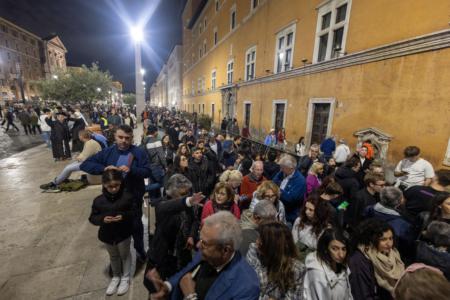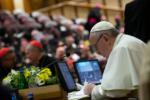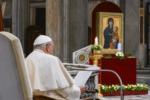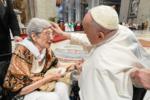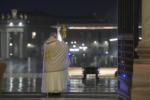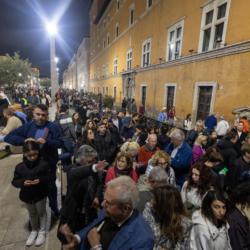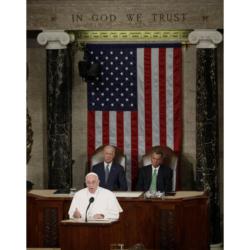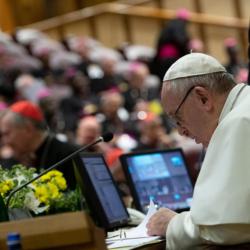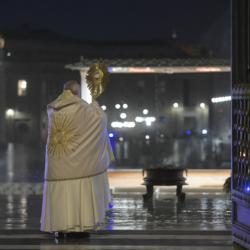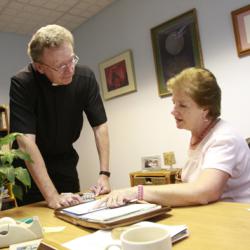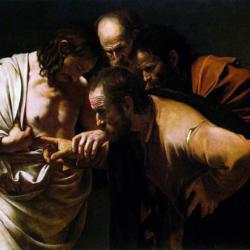Pope Francis leaves complicated legacy on addressing the sexual abuse crisis
ROME (OSV News) -- Throughout his papacy, Pope Francis, who died April 21 at the age of 88, faced the sexual abuse crisis in the Catholic Church, attempting to balance defending the church from criticism while showing compassion toward survivors, with often mixed results.
Nevertheless, while the fruits of the reforms made throughout his 12-year papacy are yet to be determined, what can't be denied is his pastoral approach that tried to place victims at the heart of the church's response to clergy sexual abuse, which he regarded as demonic in nature.
"The abuse of minors is truly a horrible crime. ... A priest who does this betrays the body of the Lord," the pope told journalists aboard his return flight from the Holy Land in May 2014. "It is like saying a black mass."
In 2013, less than a month into his pontificate, Pope Francis met with the prefect of the then-Congregation for the Doctrine of the Faith, Cardinal Gerhard Müeller, urging him to "act with determination regarding cases of sexual abuse."
In the same year, he also amended Vatican City State's penal code to include explicit definitions of sexual crimes and aligned it with international standards. In 2014, he established the Pontifical Commission for the Protection of Minors.
Conflicting Actions
While these initial actions were a step forward, the pope's first meeting with victims took place more than a year after his election.His attempts to reach out to victims, as well as calls for zero tolerance on abuse were marred, however, in 2015 with his appointment of Bishop Juan Barros to lead the southern Chilean Diocese of Osorno.
Chilean abuse survivors had alleged that Bishop Barros -- then a priest -- had witnessed their abuse by his mentor, then-Father Fernando Karadima. In 2011, Karadima was sentenced to a life of prayer and penance by the Vatican after he was found guilty of sexually abusing boys. He was defrocked by Pope Francis in 2018 and died in 2021.
Victims urged him to rescind the appointment, including Juan Carlos Cruz, who had sent a letter to the pope detailing his abuse at the hands of Karadima, which he said then-Father Barros and others saw but did nothing to stop.
Nevertheless, the Vatican issued a rare statement March 31, 2015, defending the bishop's appointment, saying that the then-Congregation for Bishops "carefully examined the prelate’s candidature and did not find objective reasons to preclude the appointment."
However, Bishop Barros' appointment, as well as Cruz's letter, would later serve as a wake-up call for the pope and the Catholic Church in its approach toward confronting abuse.
A 'Slap in the Face' to Survivors
The anger over Bishop Barros' appointment was particularly palpable during Pope Francis' visit to Chile in January 2018.
Before celebrating his final Mass in Iquique, local reporters asked the pope about his support for Bishop Barros despite the allegations against him.
"The day they bring me proof against Bishop Barros, I will speak. There is not one piece of evidence against him. It is calumny. Is that clear?" the pope responded.
Karadima's victims were appalled, saying the pope's words made his apologies for the abuse crisis during the trip seem hollow.
During his return flight from the trip, the pope apologized to victims, saying his words were "a slap in the face" to survivors.
Nevertheless, the pope stood by his decision to defend Bishop Barros, saying that he was "personally convinced" of his innocence and that no evidence came up against the bishop who was investigated twice.
However, on the flight, a journalist questioned the pope regarding evidence against the bishop, to which the pope replied: "You, in all goodwill, tell me that there are victims, but I haven't seen any, because they haven't come forward."
Several members of the Pontifical Commission for the Protection of Minors confirmed to The Associated Press that Pope Francis was hand-delivered Cruz's letter detailing Bishop Barros' presence during his abuse.
After the trip, the outrage over his continued defense of the bishop, coupled with the growing evidence of a cover-up, prompted the pope to open an inquiry on the Chilean church, led by Archbishop Charles Scicluna and Msgr. Jordi Bertomeu, in January.
By April, the pope sent a letter to the country's bishops in which he apologized for underestimating the seriousness of the sexual abuse crisis in the country. That same month, the pope met with survivors of Karadima's abuse, including Cruz, as well as James Hamilton and José Andrés Murillo.
Recalling that encounter in the National Catholic Reporter a few years later in March 2023, Cruz wrote: "As we traveled through the pain, his face, his posture and his occasional words felt sincere, unlike others who through the years had just pretended to listen. We cried and laughed. I went in with a huge backpack of anger and pain and came out of the grave, like Lazarus, feeling that I had a second chance and more motivated than ever to help others. He changed my life."
He added: "I am not saying that Pope Francis is perfect or that he has solved everything that needs to be solved, but who is and who does? He sincerely tries. I see it when he invites, cares and loves everyone."
In May 2018, the pope held a three-day meeting with Chilean bishops to discuss the findings of the 2,300-page report compiled by Archbishop Scicluna and Msgr. Bertomeu following their investigation. On the final day, the country's 34 bishops submitted their resignations to the pope.
By the fall of 2018, the Vatican press office announced that Pope Francis would convoke a global meeting on clergy sexual abuse.
The Summit and Beyond
In February 2019, Pope Francis convened the four-day summit with the presidents of the world's bishops' conferences, the heads of Vatican dicasteries and representatives of religious orders to confront the horrors suffered by victims and to prompt concrete action in safeguarding and accountability.Outside the Vatican, hundreds of demonstrators, many of them survivors of abuse, called on the church to do more than just offer consoling words.Participants heard testimonies from survivors who described in great detail the abuses they suffered."You are physicians of the soul and yet, with rare exceptions, you have been transformed -- in some cases -- into murderers of the soul, into murderers of the faith," one survivor said in his testimony.The meeting resulted in a set of new norms, including guidelines on the protection of minors and vulnerable persons.
"With the February 2019 meeting, Pope Francis wanted real transformation," Kim Daniels, a member of the Vatican Dicastery for Communication and director of the Initiative on Catholic Social Thought and Public Life at Georgetown University, told OSV News. "He wanted to bring the world's bishops together not to have a regular conference, but for something that would result in a conversion of hearts," and for that, she said, he wanted survivors in the room.
It was "keeping victim survivors at the front, resisting clericalism, speaking with humility and standing in solidarity with victims," that really made a difference, along with making the voices of laity central during the meeting. "In resisting clericalism, lay voices are critical," Daniels said, praising Pope Francis for being open to putting them in the frontlines of the meeting, but also -- at large -- of his leadership.
The discussions and conclusions from the summit undoubtedly led to further norms and procedures during Pope Francis' papacy, including his May 2019 motu proprio, "Vos Estis Lux Mundi" ("You are the light of the world"), which spelled out procedures for holding bishops accountable not only for committing abuse, but also for covering up or failing to address abuse allegations.Yet for some survivors and victims' advocates, the new procedures were pointless if not implemented by the church.
Anne Barrett Doyle, co-director of BishopAccountability.org, a U.S. nonprofit that investigates clergy abuse cases, told OSV News: "It was just another self-policing set of measures that restrict the participation of laypeople. Few sanctions have been applied as a result of them," Barrett Doyle said. "The only bishop who was defrocked in that process was (Theodore) McCarrick."
McCarrick, the former cardinal and archbishop of Washington, was removed from the priesthood by Pope Francis in 2019 after accusations of sexual abuse and harassment had surfaced the year before. It was under Francis that a massive report on his actions and negligence reaching deep into the Vatican was published.
In a statement published April 21, on the day of the pope's death, BishopAccountability.org said his handling of abuse will "forever tarnish the legacy of this remarkable man.""We needed Pope Francis to permanently remove abusers from ministry and decisively punish enablers. We needed him to rid canon law of its bias in favor of accused priests. We needed him to follow through on his promises of transparency, by releasing abuse data and the names of offending clergy and complicit bishops. Pope Francis chose to do none of these things. He instead maintained the secrecy of his predecessors and addressed the crisis with superficial measures that have fallen short. Most perversely, he repeatedly defended, protected and gave soft landings to offending bishops and high-ranking clerics," the organization said.
For Stephen White, executive director of The Catholic Project at The Catholic University of America in Washington, "'Vos Estis Lux Mundi' was a major step in the right direction, particularly for holding bishops accountable.""But its implementation has been uneven, at best, and transparency about the process remains elusive," he told OSV News. "You might say that one of the great lessons of this pontificate has been learned in the breach: Justice requires the impartial application of law, something that Pope Francis was frequently unable or unwilling to do. He preferred to handle cases -- high-profile cases -- on an individual and personal basis. The results were often unedifying."On the sidelines of the summit, representatives of survivors' groups from around the world met with the summit's organizing committee.Among them, was Peruvian journalist Pedro Salinas, a former member of Sodalitium Christianae Vitae, who recounted the physical and psychological abuse he suffered at the hands of the movement's founder, Luis Fernando Figari.Yet, it would not be the last time that the church would hear about Sodalitium.
Backward and Forward
While the church seemed to be inching in the right direction, survivors once again questioned Pope Francis' commitment to stamping out abuse.In 2022, it was revealed that former Jesuit Father Marko Rupnik, whose artwork decorated churches and basilicas around the world, including the Vatican's Redemptoris Mater chapel, was briefly excommunicated by the church in 2020 for absolving an Italian novice with whom he had had sex. The excommunication was lifted after he repented.The Jesuits disclosed in December 2022 that it had suspended the Slovenian artist after allegations of sexual, spiritual and psychological abuse had surfaced. However, the Jesuits said the doctrinal dicastery dismissed the claims because the allegations surpassed the statute of limitations.Father Rupnik's victims, some of whom were abused while helping install his mosaics, have called for the removal of Father Rupnik's artwork as it is a painful reminder of the abuse they suffered.Despite that, the pope continued to have the priest's artwork displayed in his private quarters, sometimes appearing in video messages he had sent.It was only after the public outcry over the Vatican's refusal to prosecute that Pope Francis was prompted to remove the statute of limitations that impeded the investigation.White told OSV News that the lack of action against Father Rupnik by the Vatican and the pope at the time accusations surfaced was "the most poignant reminder -- though far from the only one -- of the double-standard that has been the hallmark of this pontificate when it comes to handling abuse allegations.""In the past, well-connected priests and prelates were sometimes insulated from justice, causing tremendous scandal," he said.
Yago de la Cierva, a Spanish communications professor who teaches at the Pontifical University of the Holy Cross in Rome and the author of a book on crisis management for the church, added that church investigations, including the one concerning Father Rupnik, continue to be kept secret -- even victims aren't updated on the progress of their cases. "The church, which is the mother of the faithful, should treat them much better than the civil law does," he said.
Survivors and advocates echoed the calls for more transparency in the church -- a task now left on the desk of Pope Francis' successor.
"A lack of transparency causes victim survivors to feel retraumatized, fearful and makes them feel as if they are held in contempt by the institutional church," Antonia Sobocki, Catholic director of the British-based LOUDFence organization, told OSV News. "It adds insult to injury and prevents dialogue which is the catalyst for truth, healing and the reestablishment of the right relationship between the injured and the institutional church," she said.
While the Rupnik case caused the pope's record on abuse to take two steps back, his actions regarding Sodalitium were seen as a step forward in the right direction.
Sodalitium Christianae VitaeThe first allegations of abuse within the movement first surfaced in 2000. However, the claims gained renewed attention in 2015 after Salinas and fellow journalist Paola Ugaz co-wrote a book titled, "Mitad Monjes, Mitad Soldados" ("Half Monks, Half Soldiers") detailing the alleged psychological and sexual abuse, as well as corporal punishment and extreme exercises, that young members of Sodalitium Christianae Vitae were forced to endure.A 2017 internal investigation would later reveal the scope of the abuse to which victims were subjected. According to the report, Figari, German Doig, the movement's vicar general, and other high-ranking former members abused 19 minors and 10 adults.Given the group's continued attempts to silence victims, as well as its questionable financial practices in Peru, the pope launched an investigation into Sodalitium in July 2023, once again, following the Chile mission, sending Archbishop Scicluna and Msgr. Bertomeu.A year after their investigation, the Vatican announced the expulsions of more than a dozen high-ranking members of Sodalitium, including its founder, Figari.However, those expulsions weren't enough and on Jan. 20, Sodalitium confirmed reports that it was suppressed by Pope Francis. The Vatican formally confirmed suppression of the movement April 15. José Enrique Escardó, the survivor who first exposed the abuse 25 years ago, met with Pope Francis Jan. 24 and said his meeting with the pope was very brief because "he listened to me and I liked that a lot." He added that the pope was "saddened" and "disgusted" by Sodalitium abuses.
Survivor's Voice
Sobocki, who is a survivor of abuse she suffered in her own family and who experienced priestly ministry that helped her heal, told OSV News that Pope Francis above all was "a really kind compassionate priest."
"There are a few priests who have an extraordinary capacity for pastoral care which changes the lives of the people they accompany. Father Damien was one of them and Pope Francis is another," she said, comparing the pope to the priest who, with his attitude toward her -- a person terribly hurt -- was "a friend, mentor, teacher."
"I believe Pope Francis really wanted zero tolerance of abuse and he has sought to achieve this with robust policies and procedures and changes to canon law which are all a critical component of the solution but on their own, they will never be sufficient," Sobocki said. "There must be zero tolerance of anti-safeguarding attitudes and an outright rejection of injurious stereotypes about survivors. Until we approach safeguarding through the lens of the survivor, we will never be able to reform cultural attitudes to safeguarding in the church."
"In order to do as Pope Francis really requests, we must do more than follow the letter of the law with regard to safeguarding," she said. "We must embrace the spirit and culture of safeguarding. To protect the vulnerable and marginalized must be a manifestation of our faith. It is for this reason I would assess Pope Francis' legacy as the start of a revolution of compassion but a revolution which has yet to spread to all parts of the church."For some survivors and advocates, Pope Francis will be remembered for his empathy and his attentiveness toward their stories of suffering at the hands of the clergy.
This story of conversion, however, is unfinished, experts say.
Clericalism, as another major root of the abuse crisis, still needs to be tackled, Daniels said, adding that Francis will be remembered for such an effort.
"He certainly put many things in motion. ... His attitude led to an increasing search for truth and justice, even as much more remains to be done" she told OSV News.
But in Barrett Doyle’s opinion, "Francis confused us. His promises were so hope-giving, but he didn’t do anything to make them come true," she concluded.
Julio Córdova, a Bolivian sociologist and an expert in the Latin American religious dynamics added that too often the same pattern was followed by dioceses and congregations -- that once the scandal erupts in the media -- we take care of it, like in the case of a Spanish Jesuit in Bolivia whose horrific abuse was revealed by El Pais in May 2023.
"They tried to safeguard their reputation before worrying about the victims. And they only took an action when the scandal broke out in the media, not out of repentance," Cordova argued, adding that during Francis’ pontificate "little has changed in that pattern."
La Cierva added: "The episcopal conferences need to have power to act. Otherwise, we’ll keep having unequal, incoherent responses. That’s a part of the reform that Francis didn’t complete."
For White, the Catholic Church's credibility on sexual abuse "can no longer hang upon the goodwill or personal judgment of the pope, as important as those are.""Justice must be done and must be seen to be done," White said. "Pitting justice against mercy, as has sometimes happened in Francis' pontificate, is a disservice to all. For the sake of victims, for the sake of the people of God, for the credibility of the church, for the sake of due process for the accused, the reestablishment of a reliable, impartial system of justice in the church is absolutely necessary."
--
Junno Arocho Esteves writes for OSV News from Rome. Eduardo Campos Lima contributed to this report.
